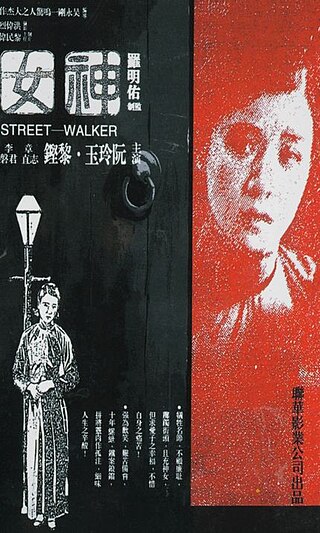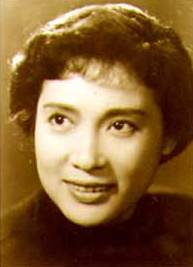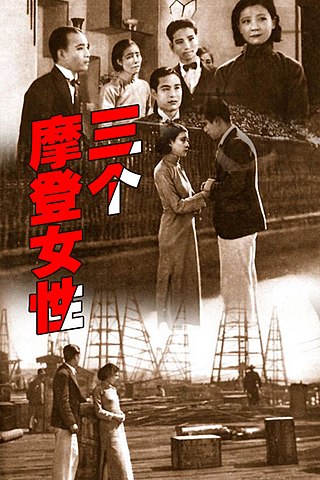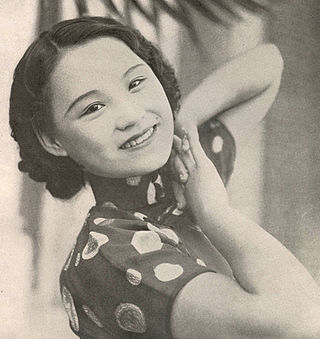
Ruan Lingyu, also known by her English name Lily Yuen, was a Chinese silent film actress. One of the most prominent Chinese film stars of the 1930s, her exceptional acting ability and suicide at the age of 24 led her to become an icon of Chinese cinema.

Center Stage, also known as Actress and Yuen Ling-yuk, is a 1991 Hong Kong biographical drama film directed by Stanley Kwan. It follows the life and career of silent film actress Ruan Lingyu (1910–1935), portrayed by Maggie Cheung.

The United Photoplay Service Company was one of the three dominant production companies based in Shanghai, China during the 1930s, the other two being the Mingxing Film Company and the Tianyi Film Company, the forerunner of the Hong Kong-based Shaw Brothers Studio.
The Xinhua or New China Film Company, was one of the film studios to capitalize on the popularity of the leftist film movement in 1930s Shanghai, that had begun with the Mingxing and Lianhua studios. It is not related to the modern-day Xinhua News Agency. The production company lasted from 1934 until 1942, when it was absorbed into a Japanese-controlled conglomerate, Zhonglian.

New Women is a 1935 Chinese silent drama film produced by the United Photoplay Service. It is sometimes translated as New Woman. The film starred Ruan Lingyu and was directed by Cai Chusheng. This film became one of Ruan Lingyu’s better known works. Her suicide on International Women’s day drew attention to the controversial status of new women and made this film a sensation in modern China.

The Goddess is a 1934 Chinese silent film released by the Lianhua Film Company. The film tells the story of an unnamed woman, who lives as a streetwalker by night and devoted mother by day in order to get her young son an education amid social injustice in the streets of Shanghai, China. It stars Ruan Lingyu in one of her final roles, and was directed by Wu Yonggang. Lo Ming Yau produced the film and Hong Weilie was the cinematographer.

The Peach Girl, also known as Peach Blossom Weeps Tears of Blood, is a 1931 silent film written and directed by Bu Wancang. The cast included some of the major movie stars of the periods including the Korean born actor Jin Yan and the actresses Ruan Lingyu and Zhou Lili.

Mulan Joins the Army, is a 1939 Chinese historical war film. It is one of several film adaptations of the Hua Mulan legend, which have included two silent versions: Hua Mulan Joins the Army (1927) by Tianyi Film Company, and a less successful Mulan Joins the Army (1928) produced by China Sun Motion Picture Company.

Bu Wancang, also known by his English name Richard Poh, was a prolific Chinese film director and screenwriter active between the 1920s and the 1960s. He was born in Anhui.

A Spray of Plum Blossoms is a 1931 silent Chinese film directed by Bu Wancang and starring Ruan Lingyu, Wang Cilong, Lim Cho Cho, and Jin Yan. It is a loose adaptation of William Shakespeare's The Two Gentlemen of Verona. The film is one of several collaborations between Bu Wancang and two of the top Chinese movie stars of the day Ruan Lingyu and the Korean-born Jin Yan and was produced by the Lianhua Film Company.
Diao Chan is a 1938 Chinese sound film directed by Bu Wancang and produced by Zhang Shankun's Xinhua Film Company. The film is a portrayal of one of the "Four Beauties" of ancient China, in this case the titular Diaochan, from the late Eastern Han Dynasty era. Like Diaochan, the film is also known by the literal translation of her name, the Sable Cicada.
Playthings, also known as Little Toys, is a 1933 silent film directed by filmmaker Sun Yu. It is one of two films Sun Yu directed in 1933. The film stars popular Chinese actress Ruan Lingyu, and was produced by the leftist film production company Lianhua Film Company. The story follows a village toy-maker, Sister Ye, who urges a group of villagers to continue making traditional playthings despite immense competition from foreign toy factories. Synonymous to many other films made during the same time period, Playthings is a patriotic propaganda film that expresses skepticism towards China's rapid urbanization and industrialization.
Night in the City was a 1933 Chinese silent film.

Qin Yi was a Chinese actress. She gained fame for her stage performances in the war-time capital Chongqing during the Second Sino-Japanese War. After the war, she became one of China's most popular film actresses throughout the 1950s and the 1960s, and was recognised as one of the country's top four actresses. Premier Zhou Enlai called her the "most beautiful woman in China".

Three Modern Women is a 1933 Chinese film directed by Bu Wancang and written by Tian Han. The film tells a story about the romantic relationships between a movie star and three women representing three archetypes of contemporary women. Released by the Lianhua Film Company, it was highly popular and won praise from left-wing critics.

Ai Xia was a Chinese left-wing silent film actress and screenwriter. She committed suicide in 1934, the first Chinese actor to have done so. Her suicide inspired Cai Chusheng's classic film New Women starring Ruan Lingyu, who also killed herself soon after the release of the film.

Chen Yanyan, born Chen Jianyan, was a Chinese actress and film producer in the cinema of Republic of China (1912–1949), British Hong Kong and Taiwan.

The Stormy Night is a 1925 Chinese drama film directed and written by novelist Zhu Shouju. Like most Chinese films from this period, it is a black-and-white silent film with both Chinese and English intertitles.

The Light of Maternal Instinct is a 1933 Chinese drama film directed by Bu Wancang, starring Lai Cheuk-Cheuk, Chen Yanyan, and Jin Yan. It is a silent film since it lacks sound for dialogues, but there is background music composed by Ren Guang. One of the songs was composed by Nie Er.
Zhang Huichong (1898–1962) was a Cantonese director, actor, sailor, and magician. He was the fifth oldest out of eleven total brothers in his extended family and the eldest brother in his immediate family. His brothers Zhang Qingpu and Zhang Huimin also worked in the film industry and founded their own film company called Huaju. One of his younger brothers, Zhang Damin, was the ex-husband of the famous silent film actress, Ruan Lingyu. Zhang Huichong is known for helping Ruan Lingyu start her acting career by urging her to audition for films and introducing her to a film producing company.















